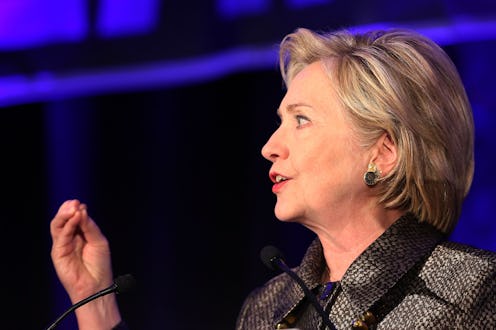News
Is Trump Really In Any Position To Slam Hillary?
With just over a month before the Iowa caucuses, The Donald is on the defense. During Saturday's Democratic presidential debate, Hillary Clinton remarked on Donald Trump's Islamophobic proposals. She claimed ISIS is "going to people showing Donald Trump insulting Islam and Muslims in order to recruit more radical jihadists." While this claim has already been declared false by fact-checkers — and Trump's team has made sure to debunk the rumor — the potential for such a statement to hold some truth is not far-fetched.
In fact, one of the primary motivators behind the infamous Charlie Hebdo terrorist attack in Paris last January was the French publication's satirical depictions of the prophet Muhammad, according to both CNN and NBC News. Although this was an attack by an al Qaeda branch in Yemen, and not ISIL or Daesh, the fundamental message Clinton made was the same: radical Islamists are more likely to target those who mock, dismiss, or openly hate their principles.
But Clinton is not the only fibber when it comes to claims about terrorism. As far as unsubstantiated claims are concerned, only weeks ago, Trump argued that hundreds of Muslims in Jersey City, New Jersey celebrated victoriously the Sept. 11, 2001 attacks. Fact-checkers and news sources quickly determined there was no validity to this assertion beyond hearsay and personal anecdote, but the larger question is why Trump chose to fabricate this story at all. Certainly, it served as a further talking point for his fear-based rhetoric — which casts many American voters into a suspicious and apprehensive frenzy — but beyond the security of his own primary voters, points like these accomplish nothing positive. This type of rhetoric incites more undue anger toward Muslim-Americans as a whole, potentially engendering more radicals through hate.
Of course, it is absolutely never acceptable to make unsubstantiated claims — and Clinton's impromptu remark about ISIS' recruiting tactics is no exception — but anyone can see the greater point she is revealing. Trump's hateful speech, and the fear it causes, can actually do far more to increase anti-American sentiment than to eradicate dangerous people and philosophies. In this sense, Clinton is easily contrasted with Trump in that her goal is to curtail or diminish anger (and violence) from both sides, while his is to incite anger (and fear) in Americans. If Clinton had instead spoken hypothetically, no person could refute her sentiment of what dangers Trump might be causing with his rhetoric.
At this point, it is absurd that Trump, who makes overtly false, illogical, and outrageous claims regularly, is attempting to fact-check Clinton on an argument that, while false, is still categorically possible. Voters have to ask if this is the type of political climate we should endure. Does America want a leader who is absorbed in attacking opposing candidates while lying through his teeth? It is up to Americans to fact-check our candidates, and Trump is far from accurate in his hateful claims.
